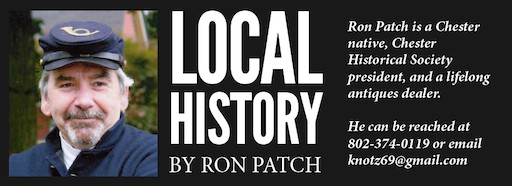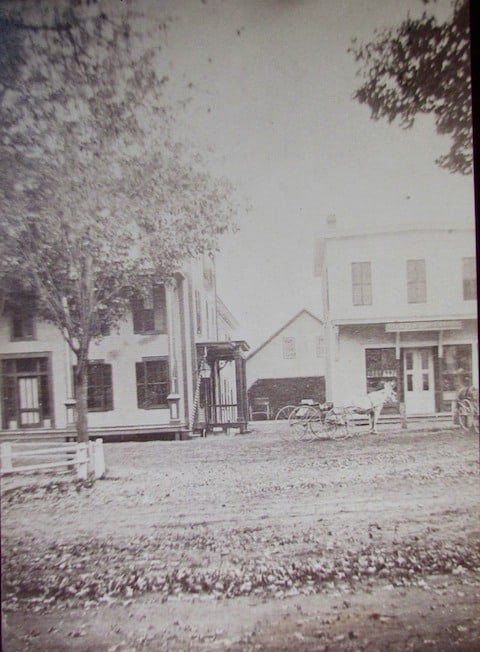
The photo with this article was a gift of Ted Spaulding to Chester Historical Society. This photo answers questions I have had for years. It dates to the mid-1880s.
The photographer was standing on Main Street looking toward the current Fullerton Hotel when he took the photo. The buildings on the left, middle, and right are gone today.

The building on the left was the Ingraham Hotel. By 1883 or so, the name was changed to the Central Hotel. H.R. Barney, “Hub” as he was known, was proprietor.
The unattractive building on the right was Chester Drug Store. F.W. Pierce was the druggist. You’ll notice it’s almost a flat roof. The beautiful barn between the two buildings was a livery stable.
What makes this photo historical you might wonder? From a June 1888 newspaper we have a report of the businesses lost in this fire. While they are referenced in the article, we had no idea what the buildings looked like ‘til now.
The Central Hotel
The Central Hotel had been known as the Ingraham until the early 1880s. Built as the Ingraham Hotel about 1860-1861, new owners changed the name to the Central Hotel in the early 1880s. Today the Fullerton occupies this location. The Ingraham had the same footprint as the hotel today.
Chester Drug Store
The building on the right was the Chester Drug Store. While the image is rather light, I can read the sign over the door: “Chester Drug Store.” The roof has a very low pitch being almost flat. F.W. Pierce was the druggist. Pierce was a director of The National Bank of Chester.
The livery
The livery stable in the rear between the two buildings was run by Orrick Ball. Look at the rooflines. It’s a beautiful building of classic New England design.
The park
On the left you can see the upper end of the green – or park as it was known. Recently I have written about restoring the park to resemble the old days. This is our historic district. I mentioned in that article how the trees were planted around the perimeter of the park, not down the middle as today. You can see a young maple on the perimeter.
I also suggested having an iron railing around the perimeter as Weston has. In this photo you can see a white wooden fence. The fence posts are granite. In my opinion, a park without a railing or fence is like a painting without a frame.
Below are excerpts from a June 1888 newspaper:
“The most disastrous fire that ever visited Chester occurred early Tuesday morning, destroying the Central Hotel, F. Pierce’s building, occupied as a drug and book store and tenement, Henry Arms’ brick block, with E.B. Lee, dry goods and groceries, and A. N. Chandler, printing office and barber shop, as tenants.
“The hotel belonged to N.O. Johnson at Colorado Springs, Col., and was occupied by H.R. Barney, hotel, Ernest Buswell, fruit and groceries, J.E. Pollard, clothing, boots and shoes, Walter Hadley, jewelry and stationary and Geo. L. Fletcher for Chester Postoffice. The buildings were entirely consumed, together with the large hotel barns, occupied by Orrick Ball for livery stables.
“The large, fine block belonging to A.D. Fletcher was repeatedly on fire, but by the timely arrival of the fire engine from the depot was saved in a damaged condition.
“It is supposed that the fire originated from a burning chimney in the ell part.”
This is just a small portion of the article. The A.D. Fletcher building is Blair Books & More today. The damage this building suffered resulted in the ell of the bookstore being rebuilt longer than before. The other buildings were lost to the fire.
The two-story brick building run by Henry Arms sat where the Masonic Lodge is today. We have one poor quality photo of this brick building.
Included in our upcoming book, “History of Chester’s Fire Departments” will be the entire newspaper article, along with the record from our Yo-Semite ledger. We also have the Central Hotel ledger that was saved from the fire. The last entry is of interest.
We have a number of photos of the Ingraham/Central Hotel. Now we can add this photo to our book so readers will have a better understanding of the severity of this fire.
In my opinion the current drug store that replaced Pierce’s drug store is much more attractive.
This week’s old saying is from Napoleon: “Never interrupt your enemy when he is making a mistake.”